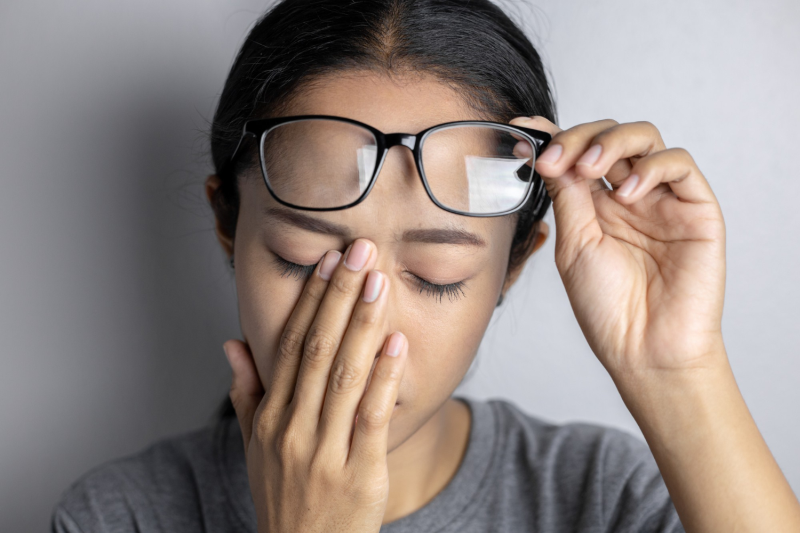Can TCM complement Western medicine?
How do TCM and Western approaches view eye disorders?
The TCM approach
Traditional Chinese Medicine (TCM) views eye disorders as a result of disturbances in the flow of Qi and blood, along with imbalances in the body. As this approach also sees the human body as an interconnected system, any imbalances in other organs, such as the liver and kidneys, the eyes may also be affected.
When it comes to the use of Chinese medicine for eye diagnosis, doctors may do so by examining the patient's eye, along with asking questions such as whether the pain is felt, or if they have had any recent changes to their lifestyle. They may also use techniques such as pulse diagnosis to examine the flow of Qi, and the state of different organs within the body.
The Western approach
The Western approach, on the other hand, views eye disorders through the lens of anatomy, physiology, and pathology. It focuses on diagnosing the eye disorder and only examines the affected organ while developing targeted treatments.
If you were to visit a doctor who uses the Western approach, there may be some similarities in the diagnostic process such as an examination of the eyes and other parts of the body, You may also be questioned about the symptoms that have been experienced. However, the diagnostic procedure will focus on the eye only, using equipment and tests to identify the anatomical issue causing the eye disorder.

What are TCM treatments for eye disorders?
Acupuncture
In the context of traditional Chinese medicine when it comes to eye treatments, acupuncture is believed to improve blood circulation to the eyes. Through the stimulation of specific points, such as Jingming, Zanzhu, and Yuyao, the flow of Qi along the meridians is said to be improved. This may help in alleviating conditions such as dry eyes, and eye strain.
Herbal remedies
Chinese herbs you may find in the remedies might include chrysanthemum, goji berries, and ginseng amongst them when it comes to conditions such as dry eyes. TCM believes in bringing the entire body into balance, not just by ensuring the smooth flow of Qi but also by restoring the harmony of the five elements within each organ. These herbs are often used in combination to create a formula tailored to the individual's condition.
Lifestyle modification
If your doctor were to provide recommendations for lifestyle modifications, do not be surprised as TCM recognises the interconnectedness of body, mind, and environment. Being asked for details of your daily life and if there are any sudden changes to your lifestyle is a common part of Chinese medicine, not just for eye diagnosis, but also for other organs. This may include dietary changes, such as selecting foods which nourish the eyes and avoiding those which may worsen your condition. Eye exercises may also be recommended to alleviate stress and tension within the organ while strengthening them. It may also take the form of stress management techniques, such as meditation, tai chi, or qi gong to promote better mental well-being, which is said to aid in eye health.
What are Western treatments for eye disorders?
Medication
When it comes to eye disorders, the medications that are prescribed may come in the form of eye drops. They may contain antibiotics, anti-inflammatory drugs, lubricants, or other medications, depending on the specific condition being treated.
Eyeglasses or contact lenses
Corrective lenses, such as eyeglasses or contact lenses, are commonly used to correct refractive errors like myopia, hyperopia, astigmatism, and presbyopia. These lenses help to improve vision and clarity by focusing light properly onto the retina.
Rehabilitative therapies
Rehabilitative therapies are aimed at improving visual skills and the quality of life for individuals with visual impairments. These therapies may include vision therapy, which involves exercises and activities to improve visual acuity, eye coordination, and visual processing skills. Low-vision rehabilitation may also be used to help individuals with significant vision loss make the most of their remaining vision through the use of adaptive devices and techniques.

How can TCM and Western treatments complement each other?
Even though TCM and Western treatments for eye disorders may have their differences, they can complement each other. The integration of both approaches can lead to a more personalised treatment plan for patients which combines the strengths of both systems.
For example, the equipment and tests to diagnose eye disorders may be taken from the Western approach and used alongside TCM’s methods of pulse examination. This can provide patients with a more holistic and balanced approach to eye care, as well as have their treatment plan tailored accordingly.
Adding on, TCM’s emphasis on lifestyle modifications in maintaining health through practices such as stress-reducing activities and practising healthy habits can also support rehabilitative therapies from the Western side. This can help in regulating the flow of Qi and alleviating negative emotions like anxiety, which patients with eye disorders are likely to face.
To better understand how TCM and Western treatments can complement each other, here is a testimony provided by Mdm Lui, a patient with us.
“I had a vitrectomy performed in 2017 to close up a pending retina hole. The operation though successful, had resulted in difficulties synchronising the images for both eyes. I consulted Dr Pat Lim two years ago aiming to help improve the retina health of my eyes. Dr Lim is a very caring and friendly TCM ophthalmologist who will spend time to review my eye condition through the OCT scan and checking on other indicators. She is always prompt in giving advice whenever I have any questions related to health or feedback on the TCM medication.
TCM takes a holistic view of the body and aims to balance and strengthen the organs in order to improve eye health, and it needs time and patience. The ready brewed medicine is very convenient for my daily consumption and Dr Lim will obtain feedback and make adjustments to the prescription to suit the individual. She also emphasises that TCM weighs emotional stress as the main cause of health issues. Hence she constantly encourages me to adopt a positive mind set, keep an active lifestyle and appreciate what we have in life. I truly appreciate Dr Pat Lim's consistent care and concern for my eyes and emotional wellbeing.“
Overall, Mdm Lui’s testimony highlights the complementary nature of Traditional Chinese Medicine (TCM) and Western eye treatments in addressing eye disorders. While Western medicine focuses on diagnosing and treating the specific condition, TCM provides holistic care to improve overall well-being and address imbalances. When both approaches are integrated, patients can be offered a treatment plan that is further customised to their needs and goals, possibly providing improved outcomes and quality of life.
Are you interested in learning more about TCM and Western treatments for eye disorders?
If you or a loved one has eye disorders and would like to know more about TCM and Western treatments for their condition, feel free to contact us and we will be in touch soon.

